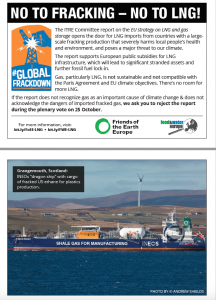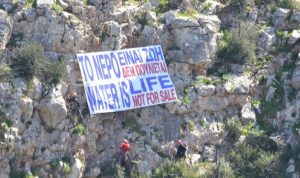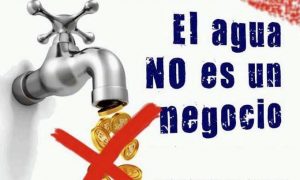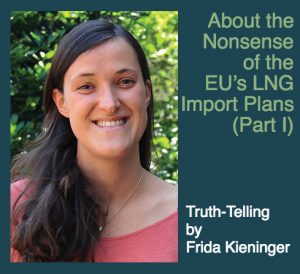Thank you for your interest, no further action on this issue is needed. Unfortunately, the report was approved on 25 October by 66% of MEPs.
 For the Global Frackdown of 2016, Food & Water Europe offers people around the globe the chance to send postcards to Members of the European Parliament with a clear message: “NO liquefied natural gas (LNG)”.
For the Global Frackdown of 2016, Food & Water Europe offers people around the globe the chance to send postcards to Members of the European Parliament with a clear message: “NO liquefied natural gas (LNG)”.
On October 25, the plenary of the EU-Parliament will vote on the report “on the EU strategy for liquefied natural gas and gas storage.” It will most likely call for a significant expansion of LNG infrastructure in Europe and for a reduction of all barriers to global trade in LNG.
We don’t want imported fracked gas in Europe and call for a rejection of the report if it does not clearly recognise the dangers of natural gas, particularly obtained by fracking, for communities, the environment and the climate.



 Brexit was a real shock here in Brussels. For the first time, a member state decided to leave the club. It was really tempting to expect a reaction, a debate about the role of EU policies in this collective failure. But this European Union captured by big companies and ruled by a dogmatic neoliberal elite keeps doing business as usual. What happened in the last few weeks in Greece was another brutal example.
Brexit was a real shock here in Brussels. For the first time, a member state decided to leave the club. It was really tempting to expect a reaction, a debate about the role of EU policies in this collective failure. But this European Union captured by big companies and ruled by a dogmatic neoliberal elite keeps doing business as usual. What happened in the last few weeks in Greece was another brutal example.
 Just one year ago we were arguing about how Spain was still resisting the last wave of water privatization, as a result of austerity policies and debt, seasoned with
Just one year ago we were arguing about how Spain was still resisting the last wave of water privatization, as a result of austerity policies and debt, seasoned with 
 The European Union is one of the biggest importers of fossil fuels in the world and the second largest importer of natural gas. Norway and Russia are currently the most important exporters of natural gas to the EU. Beyond the political and economic pitfalls of such dependence, climate science is clear that we must keep the vast majority of fossil fuels in the ground. The European Commission, however, is holding up liquefied natural gas (LNG) as the answer to the question of how Europe will meet its energy needs. This is short-sighted and wrong.
The European Union is one of the biggest importers of fossil fuels in the world and the second largest importer of natural gas. Norway and Russia are currently the most important exporters of natural gas to the EU. Beyond the political and economic pitfalls of such dependence, climate science is clear that we must keep the vast majority of fossil fuels in the ground. The European Commission, however, is holding up liquefied natural gas (LNG) as the answer to the question of how Europe will meet its energy needs. This is short-sighted and wrong.